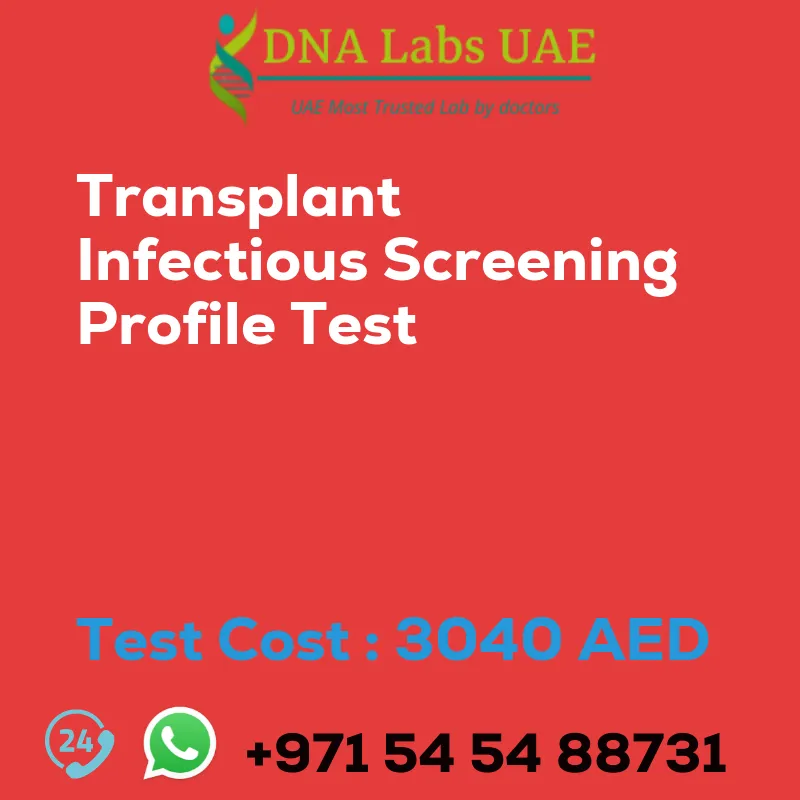TRANSPLANT INFECTIOUS SCREENING PROFILE Test
Welcome to DNA Labs UAE, where we offer the TRANSPLANT INFECTIOUS SCREENING PROFILE Test. This laboratory test is specifically designed for individuals undergoing organ transplantation. It helps screen for infectious diseases that may be present in the donor organ or in the recipient’s body.
Test Components
- Sars-Cov-2 RT-PCR
- HBsAg
- HIV 1 & 2 Antibodies Screening test
- Anti HCV
- CBC
- NLR
- LFT
- KFT
- Iron studies
- CRP
- CMV Qualitative PCR
- BK Virus Qualitative PCR
- Urine R/E
Price
The cost of the TRANSPLANT INFECTIOUS SCREENING PROFILE Test is 3040.0 AED.
Sample Condition
For this test, we require the following samples:
- 3 mL (2 mL min.) serum from 1 SST
- 8 mL (6 mL min.) whole blood from 3 Lavender Top (EDTA) tubes
- 10 mL (5 mL min.) aliquot of preferably first morning urine in a sterile screw-capped container
- Nasopharyngeal & Oropharyngeal swabs in a special Viral transport medium (VTM) available from LPL
Please ensure that the samples are shipped refrigerated and not frozen. Overnight fasting and sampling before 12 noon is preferred. It is also important to avoid iron supplements for at least 24 hours prior to specimen collection. Additionally, please make sure to provide a duly filled Covid-19 Clinical Information Form (Form 44) / SRF ID as mandated by GOI.
Report Delivery
The sample should be submitted on Mondays or Thursdays by 11 am, and the report will be delivered on Wednesdays or Saturdays.
Method
The TRANSPLANT INFECTIOUS SCREENING PROFILE Test utilizes various methods, including Real Time RT-PCR, Real Time PCR, Electrical Impedance, VCS, CLIA, CMIA, Spectrophotometry, Indirect ISE, Immunoturbidimetry, and Automated strip test.
Test Type
This test is specifically designed for transplantation purposes.
Doctor
The test is recommended by Nephrologists, who specialize in kidney diseases and transplantation.
Test Department
The TRANSPLANT INFECTIOUS SCREENING PROFILE Test is conducted in our dedicated Test Department.
Pre Test Information
Prior to the test, it is important to follow these guidelines:
- Overnight fasting and sampling before 12 noon is preferred.
- Avoid iron supplements for minimum 24 hours prior to specimen collection.
- A duly filled Consent form for HIV testing & Pre-test counselling (Form 10 & 10A) is mandatory.
- A duly filled Covid-19 Clinical Information Form (Form 44) / SRF ID as mandated by GOI is mandatory.
- Nature of specimen on Test Request Form (CMV Qualitative PCR) is mandatory.
Test Details
The Transplant Infectious Screening Profile test is essential for assessing the risk of infectious complications in transplant recipients. It includes screening for various infectious agents such as viruses, bacteria, and fungi. Some of the specific tests that may be included in the profile are:
- Hepatitis B and C virus screening
- Human immunodeficiency virus (HIV) screening
- Cytomegalovirus (CMV) screening
- Epstein-Barr virus (EBV) screening
- Herpes simplex virus (HSV) screening
- Varicella-zoster virus (VZV) screening
- Toxoplasma gondii screening
- Bacterial and fungal cultures
The results of this test help healthcare providers determine appropriate preventive measures or treatments for transplant recipients.
It is important to note that the specific tests included in the profile may vary depending on the transplant center’s protocols and the individual patient’s risk factors.
| Test Name | TRANSPLANT INFECTIOUS SCREENING PROFILE Test |
|---|---|
| Components | *Sars-Cov-2 RT-PCR *HBsAg *HIV 1 & 2 Antibodies Screening test *Anti HCV *CBC *NLR *LFT *KFT *Iron studies *CRP *CMV Qualitative PCR *BK Virus Qualitative PCR *Urine R/E |
| Price | 3040.0 AED |
| Sample Condition | 3 mL (2 mL min.) serum from 1 SST AND 8 mL (6 mL min.) whole blood from 3 Lavender Top (EDTA) tubes AND 10 mL (5 mL min.) aliquot of preferablyfirst morningurineinasterilescrewcapped container ANDsubmit Nasopharyngeal& Oropharyngeal swabs in a special Viral transport medium (VTM) available from LPL. Ship refrigerated. DO NOT FREEZE. Overnight fasting & sampling before 12 noon is preferred. Avoid iron supplements for minimum 24 hours prior to specimen collection. Duly filled Covid-19 Clinical Information Form (Form 44) \/ SRF ID as mandated by GOI is mandatory. |
| Report Delivery | SampleMon / Thu by 11 am; Report Wed / Sat |
| Method | Real Time RT-PCR, Real Time PCR, Electrical Impedence, VCS, CLIA, CMIA, Spectrophotometry, Indirect ISE, Immunoturbidimetry, Automated strip test |
| Test type | Transplantation |
| Doctor | Nephrologist |
| Test Department: | |
| Pre Test Information | Overnight fasting & sampling before 12 noon is preferred. Avoid iron supplements for minimum 24 hours prior to specimen collection. Duly filled Consent form for HIV testing & Pre-test counselling (Form 10 & 10A) is mandatory. Duly filled Covid-19 Clinical Information Form (Form 44) / SRF ID as mandated by GOI is mandatory. Nature of specimen on Test Request Form (CMV Qualitative PCR) is mandatory. |
| Test Details |
The Transplant Infectious Screening Profile test is a laboratory test that is performed on individuals who are undergoing organ transplantation. This test is used to screen for infectious diseases that may be present in the donor organ or in the recipient’s body. The test typically includes screening for various infectious agents, including viruses, bacteria, and fungi. Some of the specific tests that may be included in the profile are: 1. Hepatitis B and C virus screening: This test checks for the presence of hepatitis B and C viruses, which can cause liver damage. 2. Human immunodeficiency virus (HIV) screening: This test checks for the presence of HIV, which can lead to acquired immunodeficiency syndrome (AIDS). 3. Cytomegalovirus (CMV) screening: This test checks for the presence of CMV, which can cause serious complications in transplant recipients, especially if they are immunosuppressed. 4. Epstein-Barr virus (EBV) screening: This test checks for the presence of EBV, which can cause infectious mononucleosis and may increase the risk of post-transplant lymphoproliferative disorder (PTLD). 5. Herpes simplex virus (HSV) screening: This test checks for the presence of HSV, which can cause cold sores or genital herpes. 6. Varicella-zoster virus (VZV) screening: This test checks for the presence of VZV, which can cause chickenpox or shingles. 7. Toxoplasma gondii screening: This test checks for the presence of Toxoplasma gondii, a parasite that can cause toxoplasmosis, especially in individuals with weakened immune systems. 8. Bacterial and fungal cultures: These tests check for the presence of bacteria and fungi that may cause infections in transplant recipients. The results of the Transplant Infectious Screening Profile test help healthcare providers assess the risk of infectious complications in transplant recipients and determine appropriate preventive measures or treatments. It is important to note that the specific tests included in the profile may vary depending on the transplant center’s protocols and the individual patient’s risk factors. |







